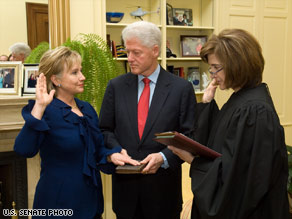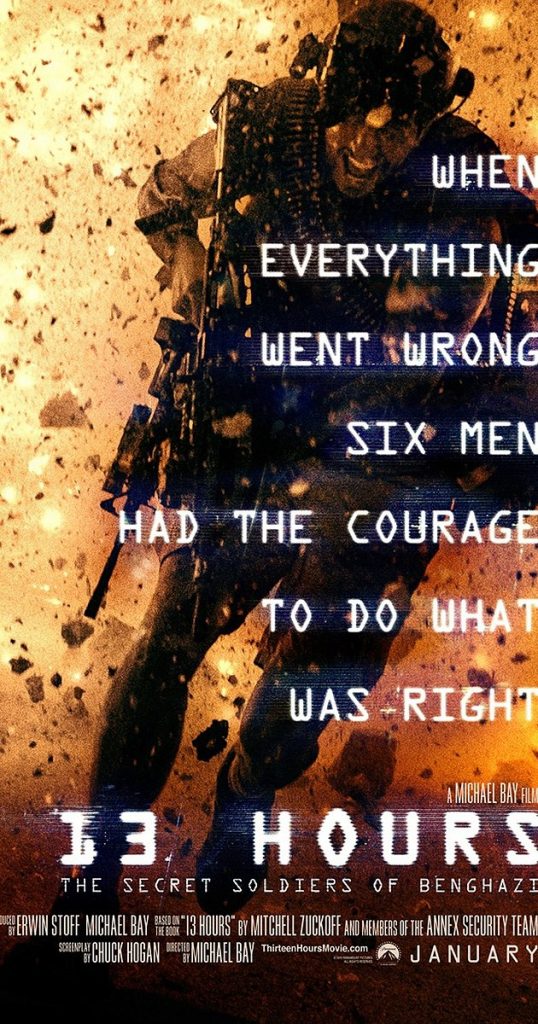 Maybe you’ve seen the movie 13 Hours. Highly recommended. If so, you’ve no doubt marveled at the ability of a handful of heroic American operatives to stave off wave after wave of attack from upwards of 50 Al Queda affiliates. FOR 13 HOURS. No doubt you’ve echoed the men in the film…Where is the rescue by American troops? Where are the F-15’s screaming overhead to put the fear of America into the terrorists?
Maybe you’ve seen the movie 13 Hours. Highly recommended. If so, you’ve no doubt marveled at the ability of a handful of heroic American operatives to stave off wave after wave of attack from upwards of 50 Al Queda affiliates. FOR 13 HOURS. No doubt you’ve echoed the men in the film…Where is the rescue by American troops? Where are the F-15’s screaming overhead to put the fear of America into the terrorists?
After today’s long awaited Benghazi report, now we know: Some of them were changing uniforms. Four times. The politics and optics were so important that the deployment never came. Today’s report reminds us how outrageous it was that Americans died with not one wheel rolling to their rescue.
Imagine for a moment…you’ve received word that your son/husband/friend was killed on September 11th while defending American personnel in Benghazi. You quickly pack, get on a plane and make the long, sad journey to Andrews Air Force Base to receive his body.
All the while your mind reels with questions…How did this happen? Why was my loved one in harm’s way not rescued by US Troops?
 On September 14th you are sitting with the other families in view of the closed, flag-draped caskets which will not be opened. You will never see your loved one again.
On September 14th you are sitting with the other families in view of the closed, flag-draped caskets which will not be opened. You will never see your loved one again.
One by one the President, the Vice-president, the Secretary of State and the Secretary of Defense offer you their condolences. Empathy washes over you from hands, faces and voices that embody the power and prestige of the United States. Empathy and promises of justice.
Hillary Clinton tells Charles Woods, father of Tyrone Woods, a retired Navy Seal killed in the attack, “We are going to have the filmmaker arrested who was responsible for the death of your son.”
She tells Kate Quigley, sister to, Glen Doherty, that she and her family should feel sad for the Libyan people because they are uneducated, and that breeds fear, which breeds violence and leads to protest.
In front of the Benghazi families Hillary Clinton tells everyone, “We’ve seen rage and violence directed at American embassies over an awful Internet video that we had nothing to do with.”
Fast forward to last October. As a result of the Benghazi hearings you know the truth. You realize that, in that sacred, intimate gathering beside your loved one’s coffin, the Secretary of State looked you in the eyes, told you how sorry she was for your loss and deliberately deceived you.
Shortly after 11 p.m. on September 11, three days before the funeral, she had e-mailed her daughter, Chelsea, “Two of our officers were killed in Benghazi by an al-Qaeda-like group.” Later that night when she spoke with the Egyptian prime minister, she dispensed with the video explanation: “We know the attack had nothing to do with the film. It was a planned attack, not a protest. . . . Based on the information we saw today, we believe that the group that claimed responsibility for this was affiliated with al-Qaeda.”
The email and phone log confirm to you the truth: the way your loved one died in Benghazi was quite inconvenient for this administration. We can never know the motive for such deception for sure, but we do know the attack happened just weeks before the election. Obama was running for re-election on the narrative that Al Queda was “on the run.” Hillary had advocated for the invasion of Libya which was clearly sinking into chaos with Al Queda on the rise.
The story about the video was endlessly repeated to the media by the White House press secretary and Susan Rice, even after an email sent from the Libya embassy in Tripoli on the day of the funeral warning US diplomats against blaming the Benghazi attack on the video.
The deceit surrounding Benghazi sounds familiar. You can’t help but remember that back in the 70’s Nixon and his inner circle lied and covered up the Watergate break-in to the DNC headquarters. You ponder the difference between an administration that lied about breaking into an office to tap some phones and an administration looking you in the eyes and lying to you about why your loved one died.
Reflecting on his own motives to deceive in the wake of Watergate, convicted Nixon aide Chuck Colson told the students at the Harvard Business School,
When I went through law school, I had a love for the law. There was one thing about which I was absolutely certain—that no one could corrupt me. Positive! And if anybody ever gave me a present at Christmas time, it went right to the driver of my limousine.
I ended up going to prison. So much for the categorical imperative. The categorical imperative says that with our own rational process we will arrive at that judgment which, if everyone did it, would be prudential and the best decision for everyone. In other words, that which we would do, we would do only if we could will it to be a universal choice for everybody.
I really thought that way, and I never once in my life thought I was breaking the law. I was so sure.
But, you see, there are two problems. Every human being has an infinite capacity for self-rationalization and self-delusion. You get caught up in a situation where you are absolutely convinced that the fate of the republic rests on the reelection of, in my case, Richard Nixon. There’s an enormous amount of peer pressure, and you don’t take time to stop and think, Wait a minute. Is this right by some absolute standard or does this seem right in the circumstances?…In my self-righteousness, I was never more dangerous.*
When people believe that the absolute best decision for everyone would be to elect or protect the president, then anything is permissible—tapping phones, lying to bereaved parents—anything—as long as the fate of the nation is in the “right” hands.
This is immoral. And in their heart of hearts everyone knows it.
After the Benghazi hearing Quigley said, “When I think back now to that day and what she knew, you know, it shows me a lot about her character that she would choose, in that moment, to basically perpetuate what she knew was untrue.”
Patricia Smith, mother of slain agent Sean Smith said, “She lies! Very simple…She’s trying to push her own agenda through.” Filled with fresh grief, Smith went on to say, “”I’ve got to know what happened. They don’t tell me. I still don’t know. The government has never told me. They have never contacted me, and I’ve got to know. That was my only child.”
In December, 2015 a New Hampshire editorial board interviewed Presidential candidate Hillary. Columnist Tom McLaughlin recounted for her these claims of victims’ family members, which Hillary has denied. “Somebody is lying,” McLaughlin told her. “Who is it?” “Not me, that’s all I can tell you,” Hillary replied.
Charles Woods’ father, an administrative judge, subsequently produced his journal where his entry after the coffin service quoted Hillary blaming the video. He has offered to take a lie detector test with her—same table, same operator. You ask yourself, which one had the motive to lie?
The apostle Paul said, “We speak truth in the sight of God.” Or not. It matters that Hillary or any of us lie because we lie in the sight of God. We lie to his face. We lie to advance our own agenda, the very opposite of love. Love lays down its agenda to serve the other person.
God is never more near than in the presence of the brokenhearted. If we can lie to the brokenhearted in the presence of God to get the “right” person elected, who are we? How can we be qualified to govern?
What is your response to the Congressional report? To the way it’s being reported in the media?

Please note: I reserve the right to delete comments that are offensive or off-topic.